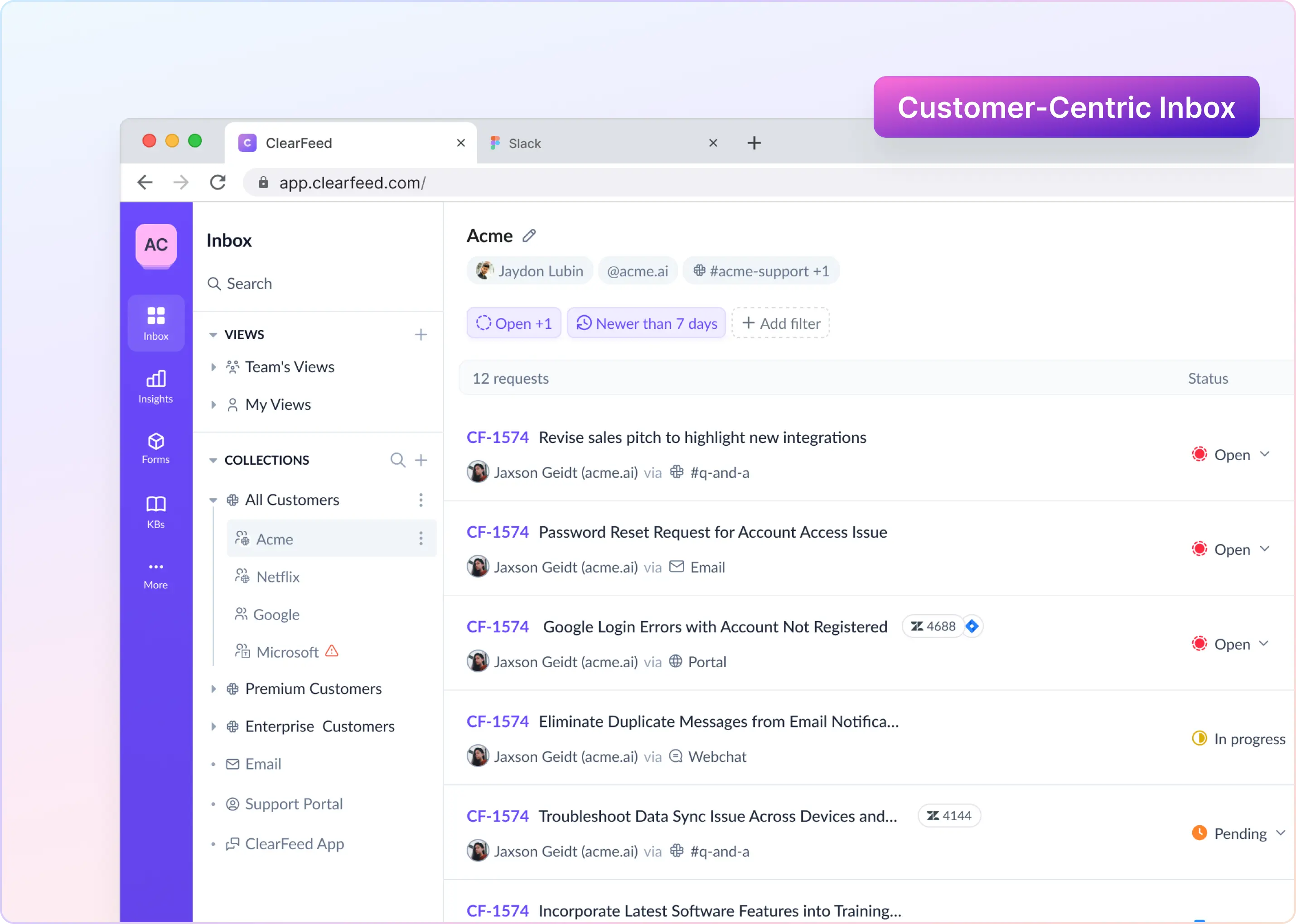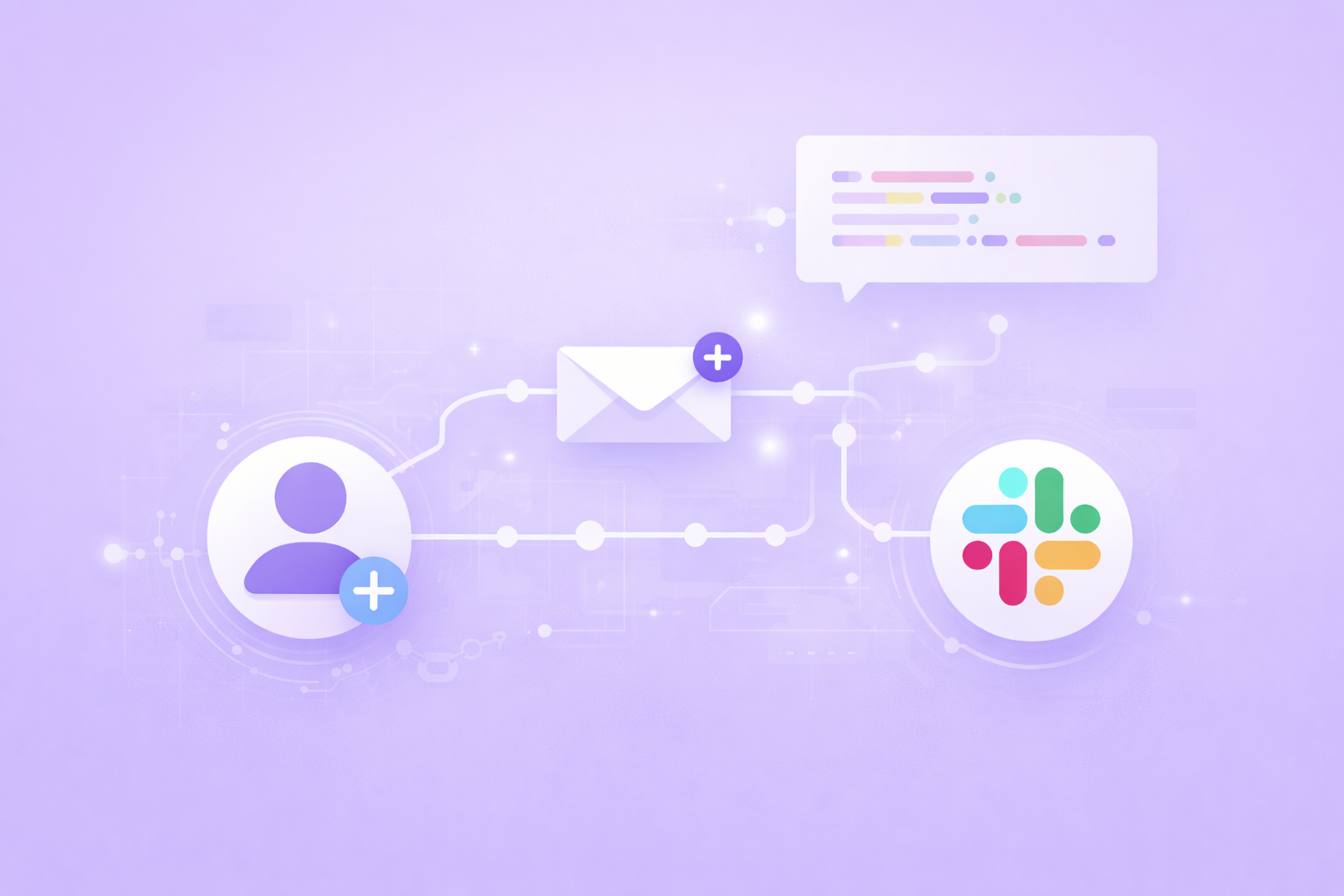In 2026, businesses are on the lookout for smarter ways to improve customer and employee support. In this blog, we’ll take a friendly dive into the top five Halp alternatives, highlighting what each option has to offer, along with their pros and cons and what the community has to say. From AI-powered help to support across multiple channels, we’ll guide you through the unique features of each solution to help you find the perfect fit for your organization’s needs. Let’s explore together!
How Did We Evaluate the Tools?
We took a closer look at different Halp alternatives by considering six important factors: how well they integrate with Slack, their ticket management features, AI and automation capabilities, support for multiple communication channels, customization options, and pricing. We chose these criteria to give you a well-rounded view of each platform’s strengths and areas for improvement, making it easier for you to find the perfect fit for your organization's needs!
1. ClearFeed
ClearFeed is the go-to Slack-native conversational support platform that centralizes and expedites request handling for customer and employee support teams. It lets your team and customers enjoy the benefits of AI and machine learning capabilities and focus on solving problems rather than worrying about technology.
Key Features
1. Work from Triage Channel: ClearFeed enhances agent experience by centralizing customer requests across Slack channels via the Triage channel. It eases assignment, request tracking, and streamlines communication using a 🔒 emoji for efficient internal commenting.

Related Read: Learn How ClearFeed’s Triage Channel Centralizes Communication and Request Management
2. Multiple App Integrations: The exceptional attributes of ClearFeed include its bi-directional integration of Slack with Zendesk and Jira software, presenting a seamless experience.

Related Read: Learn How ClearFeed Supports Slack Zendesk Integration
It maintains a synchronized status of messages across Zendesk and Slack and enables users to edit Zendesk ticket fields directly from the Slack interface, making it easy for users to work from Slack while collaborating with the broader team there.
Going beyond the limited integrations that Halp offers - ClearFeed also supports flexibility in integration with other tools, including Salesforce Service Cloud, Freshdesk, HubSpot, and GitHub.

3. Ticket Creation and Task Management in Slack: You can choose between automatic and manual methods for converting requests into tickets. Using the 🎫 emoji with a single click, you can easily transform a Slack thread into a ticket. This action can be taken by customers in a Slack Connect channel as well - enabling them to create tickets for the Support team from Slack. Tickets created in this manner are bi-directionally synced with Zendesk (or the ticketing system of choice) and customers are notified of new comments and updates in the ticket status.
4. Knowledge Management with Refined Answers: ClearFeed's Automated Answers delivers AI-powered real-time support on Slack by leveraging public documentation and private wikis.

The platform offers quick, accurate answers, streamlined workflows, editable pre-response suggestions, and federated search across multiple knowledge sources to increase efficiency and improve response time.
Pricing
ClearFeed’s pricing is flexible. You can either pay per agent (Starter at $24/agent/month, Professional at $49/agent/month) or choose usage-based pricing that starts at $40/month for a set number of channels and tickets, which works well if many teammates collaborate in Slack. Enterprise plans are custom for larger teams.
Enterprise pricing options allow custom pricing plans for those with high volumes or special needs.
G2 Reviews: 4.9 out of 5
“Customer Support Experience Differentiator. We reduced friction in supporting our customers and increased efficiencies within the support team by implementing Clearfeed.”
- Tom Walker, Head of Customer Engineering, Chronosphere
ClearFeed makes it easy to replace Halp seamlessly. Here's how.
2. Freshdesk
Freshdesk is a popular customer support and helpdesk software solution that helps businesses efficiently manage customer inquiries, requests, and support-related activities.
Key Features
- Omnichannel Support: Freshdesk delivers a seamless support experience for customer support teams with a unified platform to manage conversations across multiple channels, including live chat, email, phone, and social media. It integrates various platforms, including HubSpot, Zendesk, Salesforce, and Zoho CRM, as well as Slack and Microsoft Teams, to manage customer interactions.
- Proactive Analytics: Freshdesk leverages AI-powered analytics to identify potential issues, allowing you to create curated reports, customer satisfaction ratings, and dashboards. This enables you to optimize support workflows by continuously monitoring interactions and maintaining service quality.
- Unifying Bots, Ticketing, and Conversations: With Freshworks Customer Service Suite, teams get all essential components, including AI-powered bots, ticket management, and conversation tools, combined into one robust platform designed to exceed your customers' expectations.
Related Read: Learn How ClearFeed Supports Freshdesk Slack Integration
Pricing
Freshdesk by Freshworks offers a range of pricing plans to suit businesses of varying sizes and requirements. It starts with a free tier that supports up to 10 agents, enabling small teams to benefit from essential support functionalities.
Beyond the free tier, Freshdesk introduces higher-level plans with expanded features and capabilities. These plans are priced from $12 to $69 per agent per month (billed annually). As the pricing increases, additional features and customizations are made available to suit the specific needs of various businesses.
G2 Reviews: 4.4 out of 5
3. Zoho Desk
Zoho Desk is a cloud-based customer support and helpdesk software solution developed by Zoho Corporation. It is designed to assist businesses in managing and improving their customer service operations from multiple email, phone, live chat, and social media channels.
Key Features
- AI-driven Assistance (Zia): Zia, Zoho Desk's AI-powered assistant, helps agents deliver faster and more effective customer service through machine learning and automated response suggestions.
- Customizable Reports and Dashboards: The platform features built-in reporting tools that enable businesses to track agent performance metrics and gain valuable insights into customer interactions. Customizable dashboards help visualize key data to support better decision-making.
- Help Center (Knowledge Base): A customer self-service portal where companies can host articles, FAQs, and other knowledge resources to help customers find answers to common issues independently.
Pricing
Zoho Desk offers a range of pricing plans to meet diverse business requirements and agent capacities. The platform offers a free trial and transitions seamlessly to three paid tiers: Standard, Professional, and Enterprise.
Annual billing ranges from $10 to $29 per agent per month, depending on the selected feature and capability set.
G2 Reviews: 4.4 out of 5
4. SolarWinds Service Desk
SolarWinds provides software solutions for IT management, serving a range of industries and organization sizes. Their offerings empower support teams to effectively manage and monitor their IT infrastructure, optimize databases, ensure seamless network performance, and maintain security and compliance.
Key Features
- Automated Service Management: SolarWinds’ AI-driven auto-routing feature routes requests to the right teams and alerts them to critical issues. It applies rules to automate standard service protocols and manage recurring processes. This not only increases efficiency but also reduces the scope for errors.
- Analytics and Reporting: Its innovative reporting interface presents an in-depth analysis of IT teams. By monitoring system performance, identifying trends, and anticipating potential issues, the platform empowers the support team to make data-driven decisions that improve efficiency.
- Unified Asset Management: SolarWinds provides a unified asset management platform for managing hardware, software, and cloud-based assets. This results in increased visibility, reduced procurement costs, and optimized resource usage.
- IT Integration: Seamlessly integrates with hundreds of applications, enabling support teams to connect service desk tickets to their IT operations management system. With real-time updates and two-way synchronizations, IT teams can proactively streamline processes, reducing downtime and improving overall productivity.
Pricing
SolarWinds Service Desk offers three-tiered pricing options tailored to meet various business needs and scales: Essentials, Advanced, and Premier. The Essentials plan caters to growing teams at $39 per technician monthly.
The Advanced plan, designed for mature IT organizations, costs $79 per technician per month. The Premier plan, which offers maximum customization and advanced features, is priced at $99 per technician per month.
G2 Reviews: 4.3 out of 5
Get Customer Success on the Right Track
While customer success is essential for any SaaS business, finding the right tools to manage this process is even more critical.
Thankfully, many tools make this step easier, and we've identified six platforms that can help you maintain an efficient customer support team. If you're looking for a solution, don't just jump to the first option that comes your way—talk to multiple services and see which one is right for you.
And remember, customer success depends on a wide range of variables—it's not just about finding the right tools. Take some time to evaluate your needs, and then choose options that will work best for your business.
FAQs
What factors should I consider when choosing a Halp alternative?
When selecting a Halp alternative, consider your team's size, primary communication channels, required integrations, budget, and specific support needs. Evaluate each platform's strengths in areas like ticket management, AI capabilities, and customization options to find the best fit for your organization.
Are these Halp alternatives suitable for small businesses?
Many of the alternatives discussed offer scalable solutions suitable for small businesses. A platform like ClearFeed provides user-friendly interfaces and essential features at competitive price points. It's crucial to assess your specific needs and growth projections when choosing a platform.



.png)















